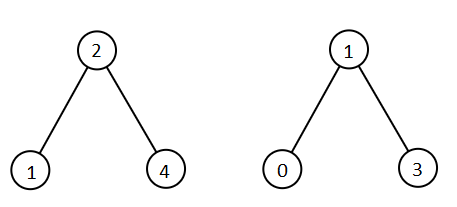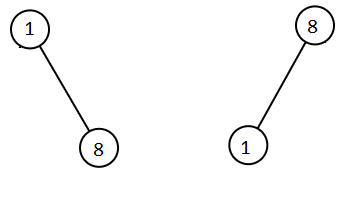Problem 1305. All Elements in Two Binary Search Trees
- Given two binary search trees
root1androot2, return a list containing all the integers from both trees sorted in ascending order.
Examples
- Example 1
- Input: root1 = [2,1,4], root2 = [1,0,3]
- Output: [0,1,1,2,3,4]

- Example 2
- Input: root1 = [1,null,8], root2 = [8,1]
- Output: [1,1,8,8]

Constraints
- The number of nodes in each tree is in the range
[0, 5000]. -10^5 <= Node.val <= 10^5
Solution
/**
* Definition for a binary tree node.
* function TreeNode(val, left, right) {
* this.val = (val===undefined ? 0 : val)
* this.left = (left===undefined ? null : left)
* this.right = (right===undefined ? null : right)
* }
*/
/**
* @param {TreeNode} root1
* @param {TreeNode} root2
* @return {number[]}
*/
var getAllElements = function(root1, root2) {
const result = [];
const dfs = (node1, node2) => {
if (!node1 && !node2) {
return;
}
if (node1) {
result.push(node1.val);
if (node1.left) {
dfs(node1.left);
}
if (node1.right) {
dfs(node1.right);
}
}
if (node2) {
result.push(node2.val);
if (node2.left) {
dfs(node2.left);
}
if (node2.right) {
dfs(node2.right);
}
}
};
dfs(root1, root2);
return result.sort((a,b) => a - b);
}Problem 1268. Search Suggestions System
-
You are given an array of strings
productsand a stringsearchWord. -
Design a system that suggests at most three product names from
productsafter each character ofsearchWordis typed. Suggested products should have common prefix withsearchWord. If there are more than three products with a common prefix return the three lexicographically minimums products. -
Return a list of lists of the suggested products after each character of
searchWordis typed.
Examples
-
Example 1:
- Input: products = ["mobile","mouse","moneypot","monitor","mousepad"], searchWord = "mouse"
- Output: [["mobile","moneypot","monitor"],["mobile","moneypot","monitor"],["mouse","mousepad"],["mouse","mousepad"],["mouse","mousepad"]]
Explanation:- products sorted lexicographically = ["mobile","moneypot","monitor","mouse","mousepad"].
- After typing m and mo all products match and we show user ["mobile","moneypot","monitor"].
- After typing mou, mous and mouse the system suggests ["mouse","mousepad"].
-
Example 2:
- Input: products = ["havana"], searchWord = "havana"
- Output: [["havana"],["havana"],["havana"],["havana"],["havana"],["havana"]]
- Explanation:
- The only word "havana" will be always suggested while typing the search word.
Constraints
1 <= products.length <= 10001 <= products[i].length <= 30001 <= sum(products[i].length) <= 2 * 10^4- All the strings of
productsare unique. products[i]consists of lowercase English letters.1 <= searchWord.length <= 1000searchWordconsists of lowercase English letters.
Solution
/**
* @param {string[]} products
* @param {string} searchWord
* @return {string[][]}
*/
var suggestedProducts = function(products, searchWord) {
const result = [];
products.sort();
for (let i = 1; i <= searchWord.length; i++) {
const prefix = searchWord.substring(0,i);
const commonPrefixProducts = [];
for (let j = 0; j < products.length; j++) {
if (commonPrefixProducts.length >= 3) {
break;
}
const product = products[j];
if (product.startsWith(prefix)) {
commonPrefixProducts.push(product);
}
}
result.push(commonPrefixProducts);
}
return result;
};Problem 226. Invert Binary Tree
- Given the
rootof a binary tree, invert the tree, and return its root.
Examples
- Example 1
- Input: root = [4,2,7,1,3,6,9]
- Output: [4,7,2,9,6,3,1]

- Example 2
- Input: root = [2,1,3]
- Output: [2,3,1]

Constraints
- The number of nodes in the tree is in the range
[0, 100]. -100 <= Node.val <= 100
Solution
/**
* Definition for a binary tree node.
* function TreeNode(val, left, right) {
* this.val = (val===undefined ? 0 : val)
* this.left = (left===undefined ? null : left)
* this.right = (right===undefined ? null : right)
* }
*/
/**
* @param {TreeNode} root
* @return {TreeNode}
*/
var invertTree = function(root) {
const queue = [root];
while (queue.length) {
const node = queue.shift();
if (node) {
const temp = node.left;
node.left = node.right;
node.right = temp;
queue.push(node.left, node.right);
}
}
return root;
};